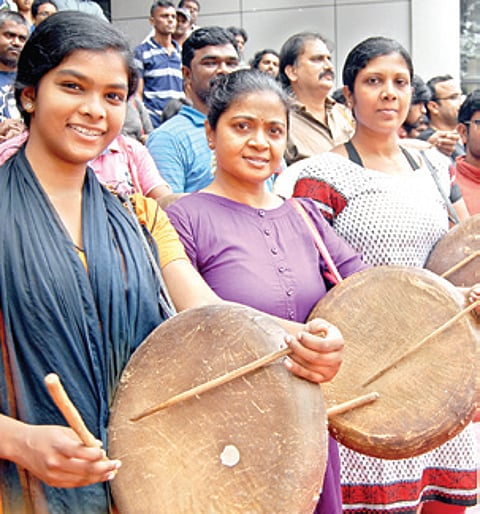

CHENNAI: Around 75 men, women and transgenders, lost in the concordant beats emanating from a percussion instrument hanging on their shoulders walk in a circle closely following the movements of their teacher at the centre. “Play it according to the rhythm,” booms the voice of 39-year-old Manimaran Maghizhini over the clattering of the Parai — an indigenous instrument synonymous with funeral processions across Tamil Nadu.
“The only people who wouldn’t have heard the sound of the Parai are the hearing-impaired,” claims Manimaran, head of the Buddhar Kalai Kuzhu, which is conducting a three-day workshop at Periyar Thidal here, teaching the specifics of Parai Isai, the associated dance steps as well as the sociology and caste dynamics behind the oft misunderstood art form.
“The Parai is not only misunderstood, but highly under-utilised by society. It is one of the oldest musical instruments. But since it is associated with a certain community, it is perhaps seen as taboo by others. I hope it is played at weddings one day,” says Tamil Nadu-born Australian citizen Se Dhinakaran. His daughter Gurukanthi (15) is among those learning the intricacies of Parai Isai at the workshop, whilst on a trip to India during her school holidays. Apart from her, five foreigners — from Canada, France and Lanka (all Lankan Tamils) — are attending the workshop.
“I’m a proud Tamil. I wanted to learn a Tamil art form. That is why I came for this workshop. Only after coming here, I got to understand the caste discrimination angle. In that way, it is completely different from other sessions I have attended in Lanka,” says S Gobinath, a Jaffna-based lecturer.
Parai has traditionally been performed by and associated with members of Scheduled Caste thus lending itself to unfortunate caste discriminations. Manimaran is, in a way, attempting to break the caste barrier associated with what is essentially an indigenous art form. “In this workshop, there are participants from every community, religion and gender,” he says. He is very particular that his students don’t touch the instrument after consuming liquor or play it in funeral processions, a practice associated with the traditional purveyors.
The workshop isn’t only about learning to play the instrument. Manimaran also discusses history, sociology and politics associated, entertaining even the silliest of doubts from the very young, around 10 of whom are part of the course.
Manimaran says he has been sharing Parai Isai since the last 15 years and has conducted around 10-15 workshops thus far.The sessions also have a small demo on how to make the Parai, while most of the practical sessions are in the space inside Periyar Thidal open to the sky.